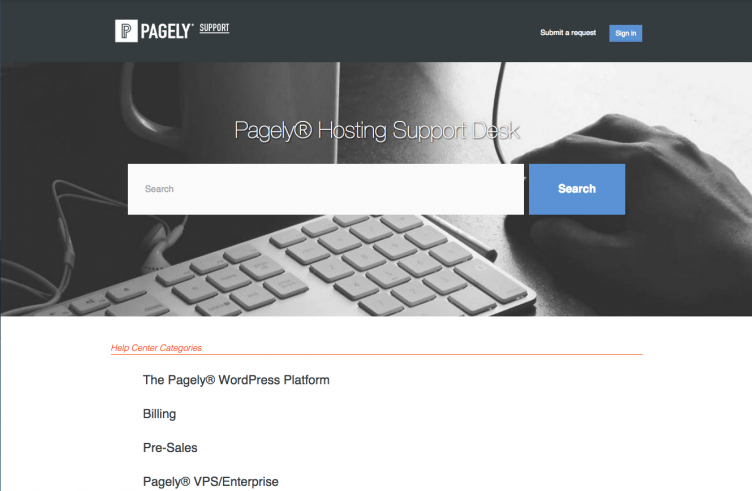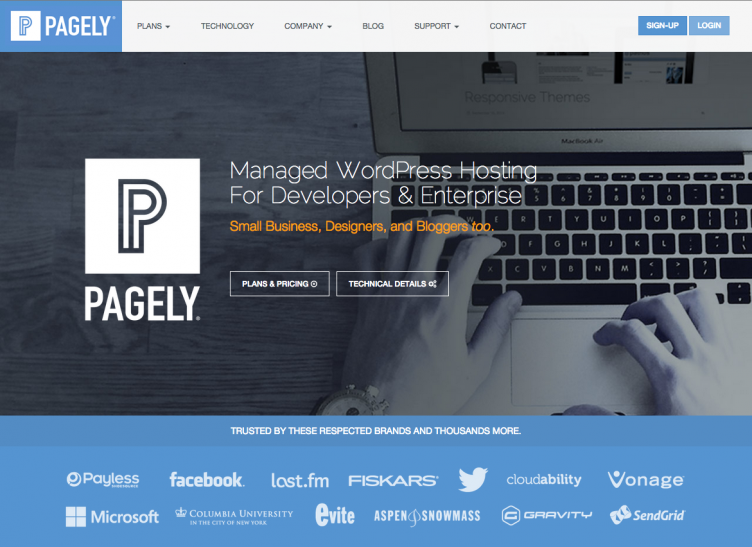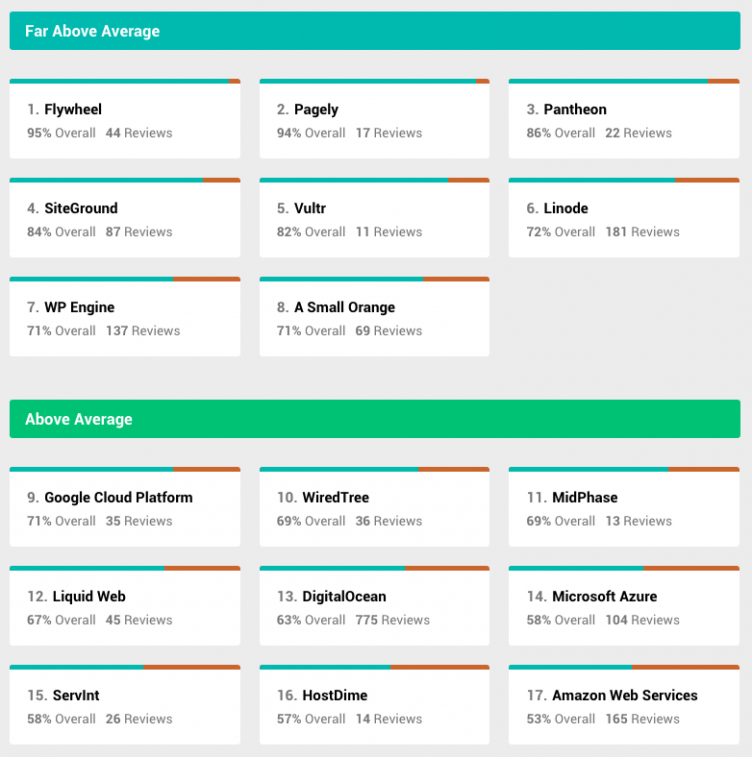
Pagely is celebrating their fifth year of business right now. They have just launched their newly designed website (note to early readers: it’s in process of launching at this moment, so some links may not work until later today) to reflect some of the ways they’ve changed over the years. They are also growing, rapidly.
The new website is a complete rebrand. They’ve tweaked their logo many times over the years, but they’ve completely changed it now. It’s much more modern and can be used in a variety of ways.
The new website is flat, geometric, modern, and as sassy as ever (like with their Investors page they are quite proud of). In all, the redesign attempts to showcase happy customers and what makes them different.
They are introducing brand ambassadors — a kind of super testimonial — that includes names you’ll surely recognize from the WordPress community.
Additionally, they are giving other managed hosts a bit of a sting with what they call #turnthepage, a dedicated page to highlight that they don’t charge for pageviews, something that most managed WordPress hosting companies do.
Pagely has implemented the new branding and design elements across most of their platform, including their Support sub-site.

In addition to branding and a web redesign, Pagely is attempting to showcase that they were first to market with managed WordPress hosting, but also that they are best in class. The strategy — and particularly their recent all-in move to being an AWS-based service — appear to be working.
Record growth
I discussed the Pagely redesign and their recent growth with Joshua Strebel, Pagely co-founder and CEO. He told me that they’ve seen an enormous amount of growth this year.
Revenue is up 28% in the last month alone and between 40-45% quarter over quarter. This means that Pagely is on pace to more than double in size between this summer and next.
To some this may seem a surprise, but it’s part of some slow and steady investments Pagely has made in recent years.
They certainly did not scale at the pace of other players in the market — most notably WP Engine. They also (as noted above with the Investors page) have bootstrapped their company from the beginning.
Noone knows exactly how big Pagely is today, and that’s part of what you get with their owners. Though I’m told they are “more than 10 people but fewer than 50.”

The Strebel’s (on the left of the picture above) own the company — only sharing equity with some key employees — and they are proud of their independence.
It’s nearly impossible to be a Pagely customer without feeling the presence of Josh and Sally Strebel’s own personalities. And while Josh is an opinionated figure in the WordPress community, Pagely customers seem quite happy with that.
Managed host customer satisfaction
Steven Gliebe started a new project recently called HostingReviews.io, a website that attempts to collect non-biased reviews from social media about various hosting solutions. Pagely has a 94% happiness rating according to HostingReviews.io — matched only by Flywheel’s 95% rating.
I like Steven’s project because he is not using affiliates at all with this project, an aspect that spoils most hosting review websites. Here’s a breakdown of some others:
Changes in managed WordPress hosting markets
It’s been an interesting time to analyze the managed WordPress hosting market. For one, the term “managed WordPress hosting” is here to stay. Nearly every large player — including the likes of GoDaddy, Bluehost, Dreamhost, and more — offer a managed WordPress hosting product.
The differences between these large company products and the original smaller players — players like Pagely, WP Engine, Pressable, and later entrants like Flywheel, Siteground, and Pantheon — are beyond the name of the product. You really have to dig into each service and business model to get a full grasp of how they are unique.
And this is really hard.
For one, you can find positive and negative things about every host in the world. But also, these companies are often targeting different audiences. For instance, GoDaddy and the other large hosts pretty clearly want the smaller website audience, but to upsell them with a more WordPress-specific package. And that’s fine; they can offer some great functionality for that.
But Pagely, Pantheon, and some others are going after bigger fish; and they are marketing themselves appropriately.
Going after WordPress.com VIP
WordPress.com VIP is the king of the big-WordPress mountain. They have the promise of infinite scale and excellent reliability. It’s Automattic’s own product and an excellent business model for them.
They are able to charge big companies big dollars (relative to other WordPress hosting, not compared to some enterprise software these companies are used to) to get the assurance that their website is hosted safely and reliably.
WordPress.com serves billions of pageviews every month. It’s simply a massive platform and a comfortable place for companies to take their WordPress hosting needs.
Pagely wants to be an alternative to WordPress.com VIP. They see themselves as a viable and attractive alternative. For one, they’ll tell you that you can run anything on Pagely; whereas WordPress VIP has a restricted ecosystem that involves approved-only plugins and stringent code reviews for any custom code, that often requires one of their VIP service partners to perform the work.
VIP is a great service. However it is no longer the only service capable of serving clients at scale. We are winning more of those high-caliber clients that need the extra flexibility our stack offers.
– Joshua Strebel, Pagely CEO
Pagely and others seeking the high end market are still relatively early on in their efforts; WordPress.com VIP is a behemoth in that market.
A changing tide
I’ve noticed — and I’m sure some of you have too — a change in tide of WordPress managed hosting. This year has no doubt been a very tough one for some managed hosts.
It’s been painful to see customers that were once happy with their service — to the point of being huge brand ambassadors themselves — to quietly leaving and moving on to something else, now with warranted skepticism.
Personally, I try to stay pretty host-agnostic. It is a very difficult market to say anything about, due to its incredibly competitive nature. However, I think it’s obvious that Pagely — accompanied by the likes of SiteGround and Pantheon — is on the rise while some of the other early entrants to WordPress managed hosting are struggling to consistently deliver on their promises.
However, with new-found popularity and fast growth, Pagely too can be susceptible to some of the same growing pains of their competition. But they say they’re ready for it.
They’ve invested heavily in AWS and put all their technology chips in Amazon’s basket. And they assure me that they have been hiring some of the best support techs and engineers in the business. Additionally, they tell me that because they aren’t investing a ton of money into marketing, their customer influx is more natural and less likely to strain more linear growth levels.
Time will tell if Pagely is ready to scale with players that have more money and resources than they do, but they’re definitely excited about the recent growth, the new brand and website, their brand ambassadors, and the challenges ahead.



Thanks Brian for writing a very informative article regarding Pagely. We are very excited about our growth because it is true growth generated by our beloved clients and not fudged by funding.
I just want to clarify that although we are going up market, we are not targeting any other hosts. When we started managed WordPress hosting, the next competitor, who came along 2 years later, validated what we were doing. As we’ve always said, there’s enough to go around for everyone. Luckily not everyone wants the same things.
Thanks again.
It’s impressive that Pagely has bootstrapped this. I got a real chuckle out of their investors page. I almost feel like I got Rickrolled, in a good way (I actually like that song). I’m glad to hear they’re growing so much. I started noticing a lot of testimonials from big name WordPress players earlier this year and that seems to have snowballed.
Thank you for mentioning HostingReviews.io. It’s been interesting to see that customers of companies that focus specifically on managed WordPress hosting are in general happier than customers using other types of hosting. The WordPress name is attached to these companies so I like hearing that people are getting what they pay for.
You mentioned “managed WordPress hosting” being a term that’s here to stay. I am concerned about that term being abused by big shared hosts who may see it primarily as a marketing term more than a promise of what is to be delivered.
Like “premium themes”, abuse of a term that’s working is inevitable, unfortunately.
I know you flagged there might be some teething issues looking at the new site for early readers of this post but does this really inspire confidence in a hosting company when their relaunched homepage looks like this for me?
http://goo.gl/bxD2uN
No excuse to have something like that happen in 2014! Especially for a top class managed hosting service.
Hey Colm,
I think it was just a short term propagation issue. Not really worth getting a tizzy about.
Hey Brian,
fair enough 🙂
issue is definitely gone now on my end too.
Now that I can see it – it looks like they’ve upped their game big time with this revamp.
Nice write up 🙂
Even if they’re all on the rise on HostingReviews.io, it strikes me as confusing and possibly misleading to mention SiteGround in the same sentence as Pagely and Pantheon. The latter are fairly similar for the reasons you mentioned, but SiteGround is a different creature in a different market with its own distinct strengths there.
Thanks for drawing attention to HostingReviews.io — it’s fantastic, and I hope to see it grow. It would be great to see how things look with a few years of data and an in-depth critical profile for each host. It’s interesting to see how much lower linode and digital ocean rate compared to other hosts who build their service on linode and DO servers. That too might reflect an apple to oranges comparison.
Well, at least you warned us recently that you need money Brian. I guess this is the first in a (long) line of paid posts? 🙁 I can understand that but I think it would be fair to mark it clearly as an advertisement.
Jason,
I wasn’t paid a penny to write this and it is in no way an advertisement. It’s just a story about a growing company that performed a rebranding, and inline with others I’ve done before.
I’ve been on WP Engine for almost a year and certainly enjoy their service, but I’m not too keen on their pageviews limit, which can quickly be consumed just by registration or comment spam, so I’ve been growing weary of them and have been looking for a replacement.
I noticed that Chris Lema switched over to page.ly lately, so I looked into it, but I’m just not happy with their pricing models. I apparently fall into an awkward spot, where I have more than 3 websites, but the next plan up is for 10 websites @ $150/mo. That’s a hard pill to swallow, when I had trouble enough justifying $100/mo for WP Engine for the same number of sites. I’ve been looking at Flywheel as a potential replacement, given their great service, and their larger pageview limits, but it certainly would be nice to find a reasonably priced managed WP host without a pageview limit.
Dave, you should check out Kinsta 🙂
Brian,
Actually, someone at Kinsta has already been in touch with me and I’m sufficiently intrigued by their approach to give them a try.